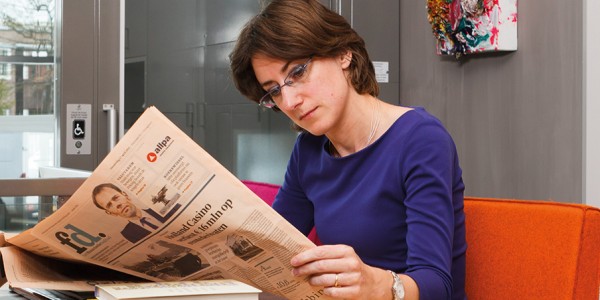
IAML intervenes “pro bono” in UK Supreme Court case AR v RN
AR v RN (Children) (Scotland)
[2015] UKSC 35
On 29 April 2015, for the first time, the IAML were given permission to intervene in the UK Supreme Court. This is an important case which concerns the significance of parental intention in the determination of the habitual residence of a child for the purposes of an application under the Hague Convention. The hearing took place on 13th May 2015. The Right Hon Lord Wilson of Culworth spoke so positively about the contribution made by the IAML - you can hear him yourself in the recording of the hearing if you listen from 25:00 in the afternoon session https://www.supremecourt.uk/watch/uksc-2015-0048/130515-pm.html.
BACKGROUND TO THE APPEAL
This appeal concerns the application of Article 3 of the Hague Convention on the Civil Aspects of International Child Abduction (‘the Convention’). Under Article 3 it is unlawful to remove or retain a child in breach of rights of custody attributed to a person under the law of the state in which the child was “habitually resident” immediately before removal or retention.
This case concerns two small children, born and raised in France, who were brought to Scotland by their mother in July 2013 with the consent of their father, who remained in France. The mother and children were to live in Scotland for the period of about a year. In November 2013 the relationship between the parents ended. On 20 November 2013 the mother commenced proceedings in which she sought a residence order in respect of the children and an interdict against the father removing them from Scotland. The father argued that the initiation of those proceedings was a wrongful retention within the meaning of the Convention on the basis that the children were habitually resident in France immediately before proceedings commenced.
The Outer House of the Court of Session concluded that the children were still habitually resident in France on 20 November 2013. This judgment was based on the fact that the move to Scotland had not been intended by both parents to be permanent. The Inner House of the Court of Session reversed the Outer House’s decision on the basis that shared parental intention to move permanently to Scotland was not an essential element in any alteration of the children’s habitual residence. The Inner House concluded that the children were habitually resident in Scotland at the material time. The father appealed to the Supreme Court on the basis that the Outer House had been correct, and that the Inner House had in any event erred in its approach. The mother argued that there had in any event been no wrongful retention.
Intervention IAML
The IAML is a not-for-profit association of specialist family lawyers practising in 49 countries. Fellows of the IAML are elected on the basis of their experience of family law and their standing in their own jurisdictions. The IAML has over 690 fellows worldwide. It has observer status at the Hague Conference and IAML fellows have attended many of the sessions on the 1980 Convention.
The IAML was represented in these proceedings by Timothy Scott QC (29 Bedford Row) and Rachael Kelsey (SKO Family Law) and submitted written submissions. The successful application to intervene in this case was made on the basis that the collective knowledge and experience of the fellows within the IAML would enable the IAML to collate and put before the Court information about how the aspects of the law of habitual residence which were relevant to this case (in particular the role of parental intention) are treated in other jurisdictions. Sandra Verburgt has taken the Dutch paragraph of the IAML submissions for her account. In this she referred among others to the Dutch Supreme Court decision of 17 June 2011 (RFR 2011/107), in a Greek-Dutch case, in which a similar situation was brought to court.
Other country reports were made by IAML fellows Ian Kennedy (Australia), Alexandre Boiché and Veronique Chauveau (both France), Edwin Freedman (Israel and USA) and IAML applicant Elga Sykiainen (Russian Federation).
JUDGMENT SUPREME COURT
On 22 May 2015 the Supreme Court unanimously dismissed the appeal.
The Court considers that, for the purposes of habitual residence, the stability of residence, rather than its degree of permanence, is important. There is no requirement that the child should have been resident in the country in question for a particular period of time or that one or both parents intend to reside there permanently or indefinitely. As the Court has previously held in a series of cases, habitual residence is a question of fact which requires an evaluation of all relevant circumstances.
In determining habitual residence, the focus is upon the situation of the child, with the intentions of the parents being merely one of the relevant factors. It is necessary to assess the degree of the integration of the child (or, in the case of an infant or young child, the degree of integration of those on whom the child is dependent) into a social and family environment in the country in question. There is no rule that one parent cannot unilaterally change the habitual residence of a child.
In the present case, the children were habitually resident in Scotland within the meaning of the Convention. The absence of a joint parental intention to live permanently in Scotland was not decisive, nor was an intention to live in a country for a limited period inconsistent with becoming habitually resident there. The important question is whether the residence has the necessary quality of stability, not whether it is necessarily intended to be permanent Following the children’s move with their mother to Scotland, their life there had the necessary quality of stability. Their home was Scotland for the time being, their social life and much of their family life was there. The longer time went on, the more integrated they became into their environment in Scotland. Given this conclusion, the question of wrongful retention did not arise.
https://www.supremecourt.uk/news/latest-judgments.html
Download this briefing in pdf
To discuss any points raised in this briefing, please contact Sandra Verburgt (verburgt@delissenmartens.nl) or your usual contact at Delissen Martens on 070 – 311 54 11.
This publication is a general summary of the law. It should not replace legal advice tailored to your specific circumstances.


